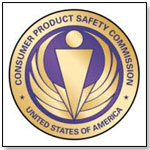 |

Tools:








"Law of the Land" Forces Compliance Amid ConfusionOfficials Detail State of the CPSIA at Toy Fair Safety Seminar
| “Like it or not, the CPSIA is now the law of the land.” — Nancy Nord, Chairman of the U.S. CPSC |
"Well-intentioned laws sometimes end up having unintended consequences."
That statement, made by Chairman Nancy Nord of the U.S. Consumer Product Safety Commission, embodied the reason for this year's Toy Safety Update Seminar at Toy Fair 2009, during which TIA and government officials discussed the cause and implementation of the Consumer Product Safety Improvement Act passed in August 2008 before hundreds of industry professionals.
 CPSC's QUALMS WITH THE LAW CPSC's QUALMS WITH THE LAW
While noting her inital welcome of the legislation, Nord also voiced five major concerns with the law, clearly echoing concerns expressed throughout the toy industry over the last several months:
— The law was created as a reaction to the significant toy recalls of 2006 and 2007.
— It does not permit the CPSC to deal effectively with safety issues in real time.
— Via the bans of lead and phthalates, "the two concepts of risk and exposure ... have been eliminated," leaving products to be assessed by the mere presence of those materials.
— Small business are threatened by the retroactive ban on lead and phthalates.
— The law increased the CPSCs workload by more than 50 percent, although the Commission was not granted additional resources.
Richard Maksimoski, vice president of R&D and Quality at Elmer's Products, was largely interested in hearing Chairman Nord's perspective on the legislation. Although her response was "about as expected" in terms of the CPSC being overwhelmed, he was encouraged by her affirmation of concern for the toy industry.
SEMINAR ADDRESSES UNCERTAINTIES
Maksimoski also found helpful "one piece about compositing of phthalates," which clarified that while lead is measured for individual parts, phthalates testing takes into account products as a whole.
"It's more reasonable, my opinion," he told TDmonthly, noting that even if a tiny sticker on a product has a high level of phthalates, there's minimal chance of exposure to a child.
One anonymous source shared with TDmonthly that the seminar clarified for him when companies are obligated to report if a product is not in compliance with the law — October 2009.
Jenn Predko, business operations manager for Buffalo Games, reported that while she encountered some "interesting points about the testing process" for both lead and phthalates, many answers to the questions she has have not yet been determined and will require further address from the agency.
MOVING ON
Prior to the Feb. 10 deadline, industry groups were pushing for a stay not only on select testing and certification, but also on the effective date of lead and phthalate bans for children's products.
That request was not met, however, leaving manufacturers to deal with questionable or non-compliant — and ultimately discarded — toys, and retailers to deal with gathering certificates of safety compliance despite an immediate requirement for them. If the industry wishes to pursue change in the law, Nord emphasized, they are encouraged to provide hard facts and statistical data so that Congress can more completely understand the way the law is affecting the industry.
During the one-year stay on testing and certification, the CPSC is working to address two main issues, Nord said. The first is a determination of whether component testing will be allowed in place of testing a final product, and if so, under what circumstances. The second concerns finalization of the rules on tracking and order requirements before further testing regulations go into effect in the coming months.
ENFORCEMENT ISN'T QUESTIONABLE
Despite the challenges of the CPSIA, it has given way to key initiatives for toy safety: the harmonization of regulations worldwide; the creation of the TIA Toy Safety Certification Program; and the launch of TIA electronic certification program. Such efforts, hopefully, will help minimize stress on an industry overcome not only by progressive implementation of new standards, but also by a terribly afflicted economy.
This is important because, as Nord stressed, the law isn't going anywhere.
"Like it or not, the CPSIA is now the law of the land," Nord said. "While we will be reasonable in our efforts to enforce the law, we will enforce it."
 Writer's Bio: Writer's Bio: Julie L. Jones has written articles for both newspapers and magazines. Before joining the staff of TDmonthly Magazine, she worked as a communications writer and provided editorial support for a market research company. Read more articles by this author
THIS BANNER IS AN AD:

• • • • • • • • • • • • • • • • • • • • | • • • • • • • • • • • • • • • • • • • |
Back to TDmonthly's front page
|  |
Advertise on TDmonthly

|

